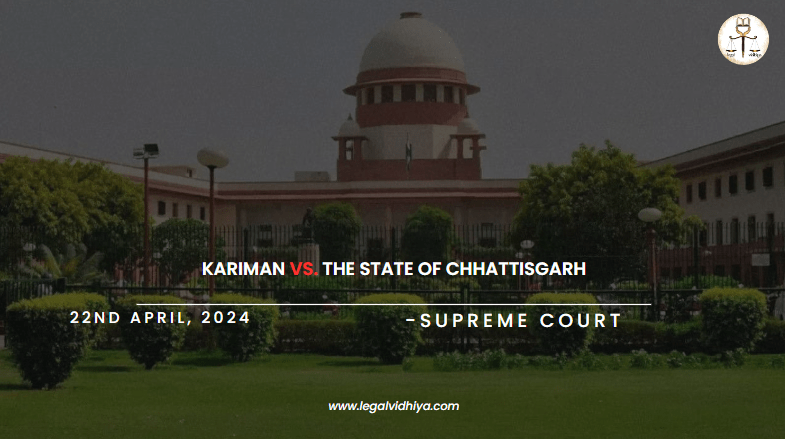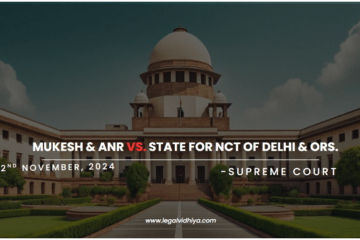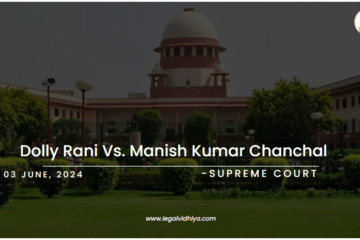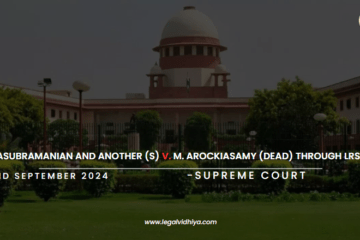
| CITATION | 2024 INSC 335 |
| DATE OF JUDGMENT | 22nd April, 2024 |
| COURT | Supreme Court of India |
| APPELLANT | Kariman |
| RESPONDENT | State of Chhattisgarh |
| BENCH | Justice B.R. Gavai & Justice Sandeep Mehta |
INTRODUCTION
The case involves an appeal filed by the accused-appellant Kariman challenging his conviction under Section 302 (murder) of the Indian Penal Code (IPC) by the trial court and the High Court of Chhattisgarh. Initially he was convicted by trial court on 30 October, 2001 case No. 359/99 and then appellant moved the High Court whereby the appeal preferred by appellant was rejected on 27 June, 2016. The appellant was not satisfied by the court’s Judgement later on through the help Free Legal Aid. Counsel was appointed by the committee to defend the petitioner and to file a special leave petition on his behalf. Throughout this paper we shall find how the Supreme Court has interpreted and given wide connotation to the section with regard to this case and it crabbed out from Murder to culpable homicide which is not amounting.
FACTS OF THE CASE
1. Kariman was living with the deceased Dasmet Bai as his second wife.
2. On 11th September, 1999, Kariman allegedly assaulted Dasmet Bai with fists and stones, causing her death.
3. Dr. R.K. Tripathi conducted autopsy upon the dead body of Dasmet Bai and issued the post mortem report taking note of a bruise admeasuring 10 cm X 8 cm on the posterio lateral aspect of left side of the body over 5th to 10th ribs area.
4. The 8th rib was found fractured underneath this injury which led to laceration of spleen causing hypovolemic shock and proved fatal.
5. Kariman was charged under Section 302 IPC and convicted by the trial court and the High Court.
ISSUES RAISED
- Whether the special leave petition filed on behalf of the accused petitioner is ground for rejection of appeal?
- whether the conviction of accused under Section 302 IPC could be converted to Section 304 Part I or Part II IPC?
CONTENTIONS OF APPELLANT
Kariman’s counsel argued that based on the evidence, the offense did not attract Section 302 IPC.
It was a case of a single injury inflicted during a sudden quarrel without cruel intentions, and the charge should not exceed Section 304 Part II IPC.
The medical evidence did not establish that the injury was sufficient in the ordinary course of nature to cause death.
CONTENTIONS OF RESPONDENT
The State argued that Kariman chased down Dasmet Bai without reason and hit her with a stone, exhibiting the intention to cause her death, thereby attracting Section 302 IPC.
JUDGMENT
The Supreme Court analyzed the evidence and found that Kariman had no motive to hurt Dasmet Bai, and the incident arose from a sudden quarrel. The medical evidence showed only one injury causing a rib fracture and subsequent internal bleeding. The Court held that Kariman’s act did not fall under any of the clauses of Section 300 IPC defining ‘murder.’ Kariman’s conviction under Section 302 IPC was modified to Section 304 Part II IPC (culpable homicide not amounting to murder with knowledge likely to cause death but no intention to cause death). Considering Kariman had already undergone 17 years of imprisonment, he was sentenced to 7 years of rigorous imprisonment under Section 304 Part II IPC and ordered to be released forthwith.
ANALYSIS
The Supreme Court’s judgment is well-reasoned and based on a thorough analysis of the evidence and legal principles. The Court correctly identified that Kariman’s act did not satisfy the requirements of ‘murder’ under Section 300 IPC and appropriately modified the conviction to the less severe offense of culpable homicide not amounting to murder under Section 304 Part II IPC. The Court also considered the period of imprisonment already undergone by Kariman and awarded a sentence commensurate with the modified offense.
CONCLUSION
This case highlights the importance of scrutinizing the evidence and applying the correct legal provisions in criminal cases. The Supreme Court’s judicious approach in modifying Kariman’s conviction and sentence upholds the principles of fair trial and proportionality in sentencing. The judgment sets a precedent for courts to carefully examine the circumstances and evidence before convicting an accused under the grave offense of murder.
References
Indian kanoon
SC ONLINE SEARCH
Disclaimer: The materials provided herein are intended solely for informational purposes. Accessing or using the site or the materials does not establish an attorney-client relationship. The information presented on this site is not to be construed as legal or professional advice, and it should not be relied upon for such purposes or used as a substitute for advice from a licensed attorney in your state. Additionally, the viewpoint presented by the author is of a personal nature.




0 Comments